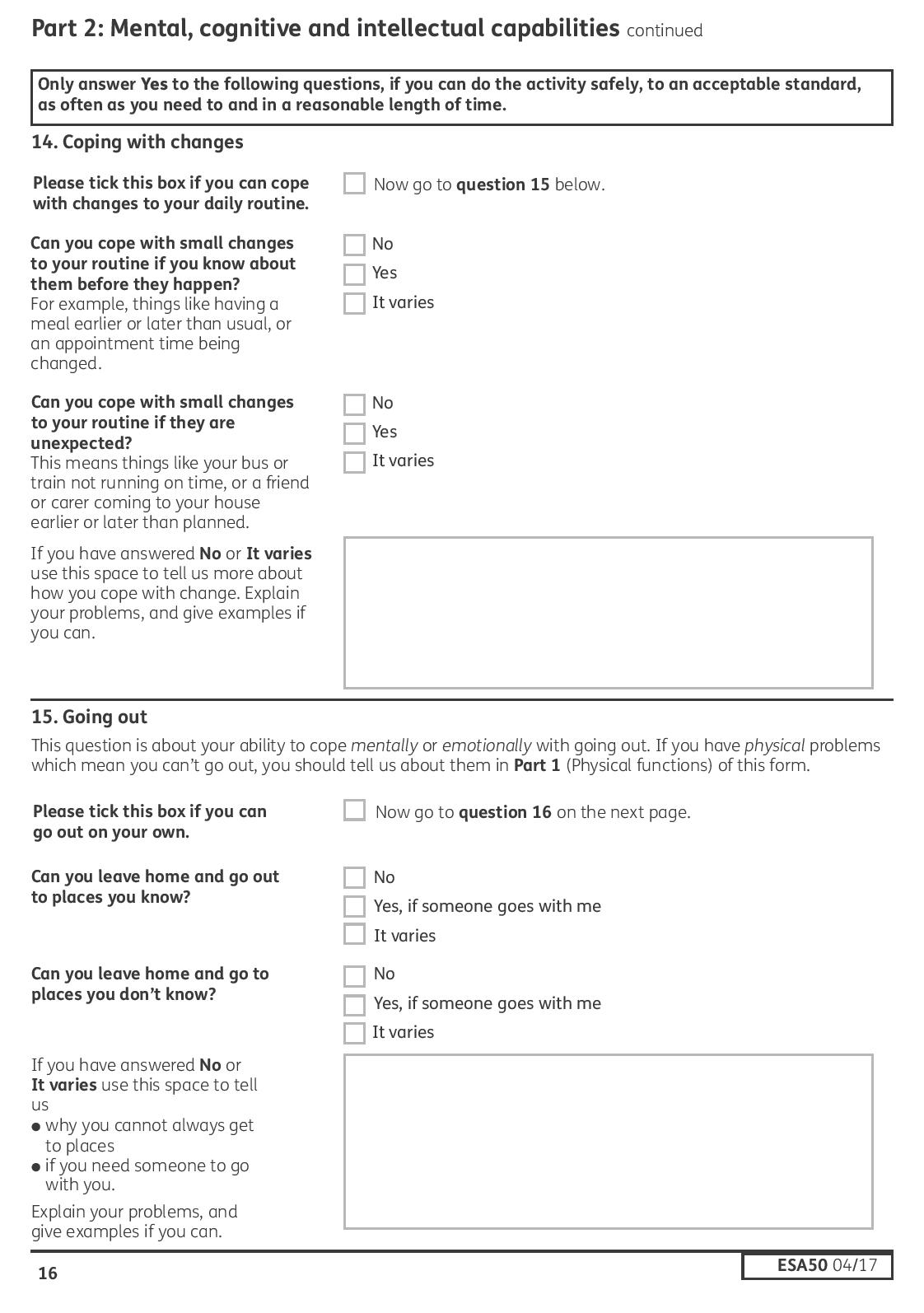Q14 - coping with changes
This advice applies to England. See advice for See advice for Northern Ireland, See advice for Scotland, See advice for Wales
This question is on page 16 of the form - see what it looks like

How to answer the question
This question is about what happens and how you feel if your routine or plans change.
"Can you cope with small changes to your routine if you know about them before they happen?"
no
yes
it varies
Think about having to eat lunch at a different time to usual - or a planned bus diversion which takes you on a different route home.
Don't feel embarrassed if you have to tick "no", for example if:
you can't deal with change at all - even if you're warned about it
change makes you withdraw and refuse help
change affects your behaviour
change stops you from being your normal self afterwards, for example you need someone to calm you down and it affects you all day
"Can you cope with small changes to your routine if they are unexpected?"
no
yes
it varies
Think about your bus or train being 15 minutes late, or a friend or carer coming to your house earlier or later than planned.
Don't feel embarrassed if you have to tick "no", for example if it takes a lot of planning and mental preparation to get ready for something - and you find it hard to cope if it gets cancelled.
What to write in the box
It's important you tell the DWP more by explaining your situation in the box.
You should explain things like:
whether you have problems coping with planned changes to your day
whether you can't cope with sudden changes
whether your medication affects how you cope with change
how you cope with change - use examples, if you can
how your day would be affected if your routine changed, for example whether you'd be able to do what you'd planned
how often you'd be affected by change in this way
anything you avoid doing because of potential problems, for example you avoid meeting friends for a meal because you'd be upset if you couldn't sit in a window seat
Jennifer says: "I find it really hard to cope with change. For example I was supposed to go to my friend Jane's house to see her, but my bus got cancelled - I was anxious for the rest of the day and couldn't eat, so my friend Jane had to come over to calm me down and cook for me.
Also last week I ran out of my favourite cereal and went to my local shop - they didn't have any left, and I couldn't do anything for the rest of the day because I was so upset."
How the DWP assess this question
The DWP look at a list of statements called 'descriptors'. They'll give you a number of points depending on which descriptor applies to you.
The DWP add together all the points you get from the whole form. This means you can qualify for ESA even if you don't get all the points for this question.
Descriptors for question 14
| Descriptors | Points |
|---|---|
|
Descriptors
14 (a) Cannot cope with any change to the extent that day to day life cannot be managed. |
Points
15 |
|
Descriptors
(b) Cannot cope with minor planned change (such as a pre-arranged change to the routine time scheduled for a lunch break), to the extent that overall day to day life is made significantly more difficult. |
Points
9 |
|
Descriptors
(c) Cannot cope with minor unplanned change (such as the timing of an appointment on the day it is due to occur), to the extent that overall, day to day life is made significantly more difficult. |
Points
6 |
|
Descriptors
(d) None of the above apply. |
Points
0 |
Next steps
Help us improve our website
Take 3 minutes to tell us if you found what you needed on our website. Your feedback will help us give millions of people the information they need.